 |
| Howard Hughes |
Howard Hughes (1905–1976) was a dashing and handsome young billionaire, airline owner, and Hollywood producer who gradually became a legendary recluse. His prolonged hermit like existence and fabulous wealth eventually inspired widespread and often conspiracy-minded interest in his bizarre dayto-day life, as well as in his involvement with a variety of schemes, scandals, and hoaxes.
Hughes’s father was the inventor of a three-headed drill bit that revolutionized the oil business. The subsequent wealth of the Hughes Tool Company
As a twenty-year-old, Hughes moved to Hollywood and became a movie producer, wooing screen starlets and fostering such swashbuckling titles as Hell’s Angels, Son of Sinbad, and The Outlaw. At the same time, Hughes shifted the family’s toolmaking fortune into aviation, even designing his own aircraft and setting records for air speed and transcontinental travel.
  |
As Hughes’s empire grew, it encompassed Trans World Airlines
In the 1940s he found himself fighting allegations of mismanagement and illegal business practices. Although his high profile and shadowy deals soon made him a target of surveillance by J. Edgar Hoover’s FBI, Hughes was able to forge a strong relationship with the CIA, leading Hughes Aircraft into the espionage business during the cold war.
By the late 1950s, however, Hughes’s emotional state began to deteriorate, leading him into personal isolation. His financial empire began to weaken, and he took refuge in a series of secret hideaways in California, Nevada, the Caribbean, South America, and Europe.
For the latter part of his life, Hughes was seen by virtually no one but his assistants. When summoned by the press, or by the courts, he was famously not available, and persistent rumors developed that he was dead and aides were running the empire in his name.
In truth, Hughes was alive, but had adopted— apparently voluntarily—a sedentary life in which he watched movies, abused drugs, and slept in darkened rooms beyond the reach of his own security staff. His obsession with germs gradually became overwhelming. He began to insist that aides use white gloves when typing memos for his attention. When touching objects (or, rarely, his aides), he insisted on using layers of tissue paper to avoid direct contact.
Despite his paralyzing fears, however, by some accounts Hughes continued to run his empire, and at times his presence was quite active in sensational public affairs. In the late 1960s, for instance, Hughes was cloistered in Las Vegas and discovered that the U.S. government was planning to test a hydrogen bomb some 100 miles away. He became obsessed with stopping the test, even attempting to bribe President Lyndon Johnson to stop it.
Some years later, Hughes’s relationship with President Richard Nixon became a magnet for allegations of conspiracy, including rumors (of doubtful veracity) that the infamous eighteen-second gap in the Watergate tapes was made in order to erase a conversation about Hughes’s illegal financial dealings with the president. In 1972, another scandal emerged when what seemed to be Hughes’s memoirs appeared in bookstores, quickly producing $1 million in sales.
However, Hughes had not written or authorized the book, and decided to disclaim it, a task made more difficult because he remained unwilling to appear in public. Finally, a conference call with reporters allowed Hughes to denounce the bogus autobiography, simultaneously demonstrating to the world that the mysterious billionaire was still alive.
Hughes died in 1976 while en route to a Houston hospital from his Acapulco hideaway. Because he died without an official will, the struggle over his fortune was fought out in courts for years. One of the prime beneficiaries of his money was the Howard Hughes Medical Institute
In a final ironic twist, one of the fruits of the Institute’s research—a procedure for kidney dialysis—might have prevented Hughes’s calamitous airborne death. It would have given the hermit billionaire yet another opportunity to intrigue the world.